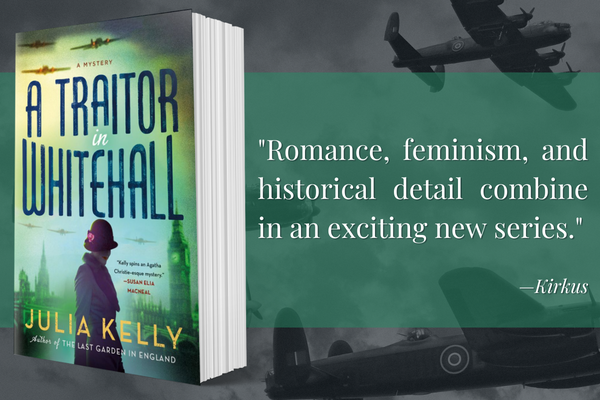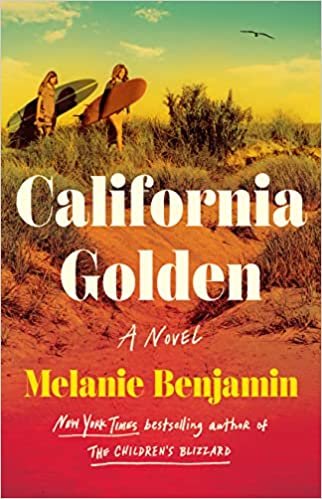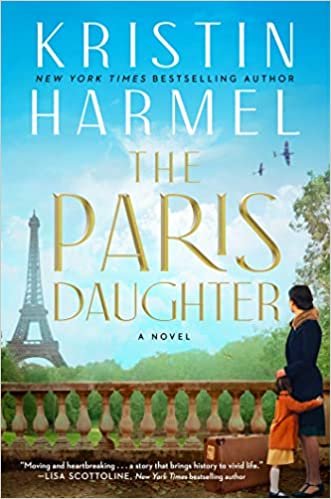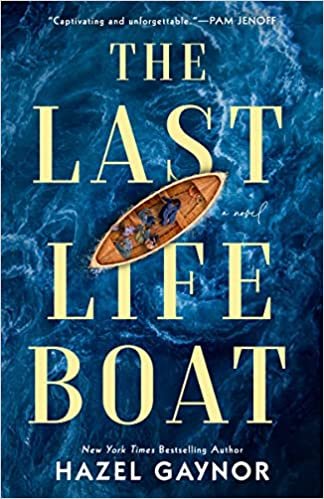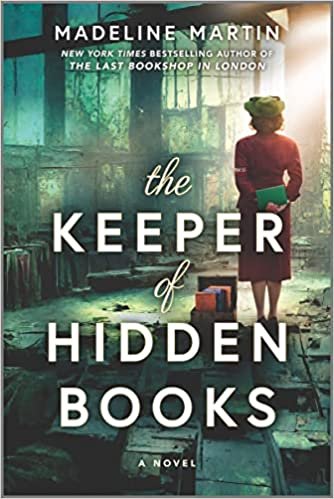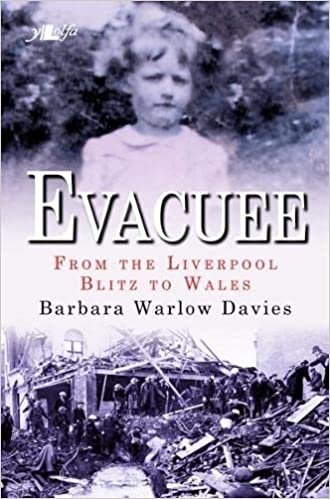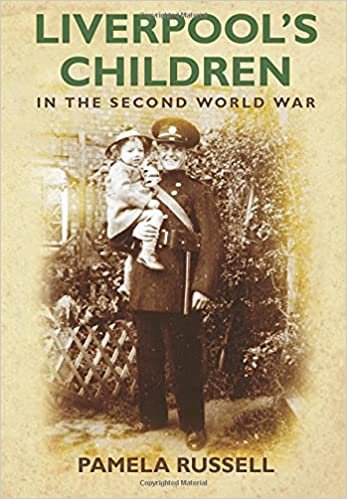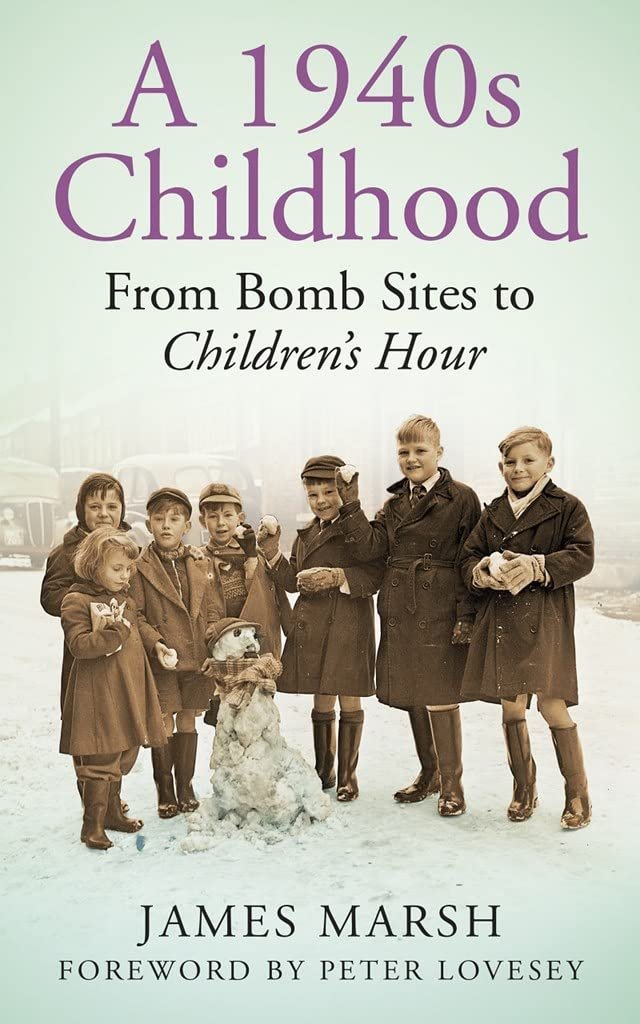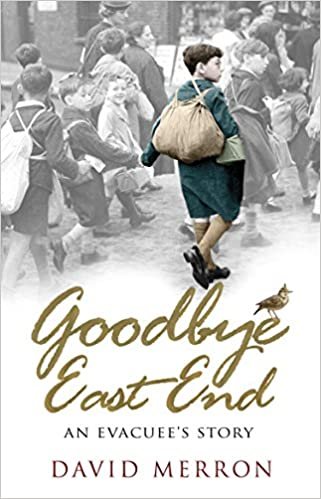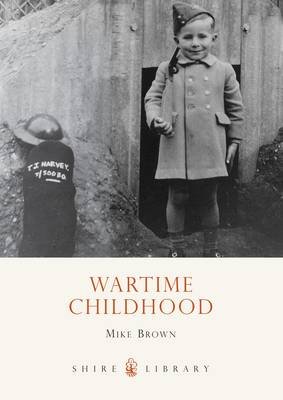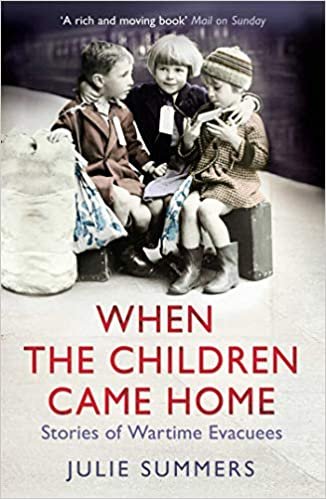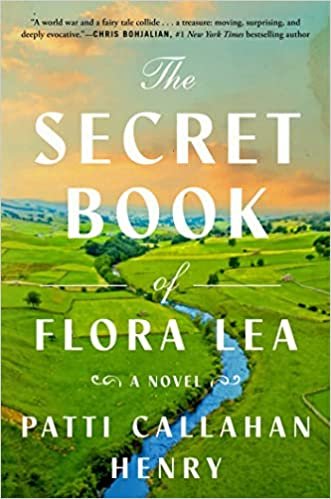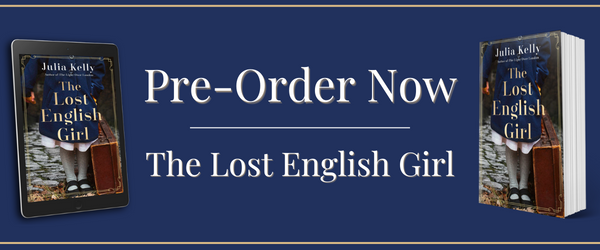Viv
January 16, 1935
On the morning of her wedding, Viv Byrne cried.
It should have been simple. All she had to do was keep her head down, walk into the registry office, and say the words that would make her Mrs. Joshua Levinson. Then everything would be okay, just like Joshua promised.
However, sitting in her pearl-gray dress, none of it felt that simple. Her bedroom door opened, and she met her sister’s eyes in the mirror. “Are you all right?” Kate asked.
Viv let her gaze shift to her own reflection. She hardly recognized the eighteen-year-old woman staring back at her with tear tracks streaking down red cheeks. She’d never thought of herself as particularly pretty— not like Kate, whose bright smile could illuminate half of Liverpool—but now she felt puffy, dowdy, and tired. Slow tears began to trickle down her face again.
“Oh, Vivie,” Kate sighed, closing the door behind her. “Don’t cry. Re- member, this is a good thing.”
Viv nodded, miserable. Yes, this wedding was a good thing—one she wanted—but it wasn’t exactly as though she had a choice.
Kate placed her hand on Viv’s shoulder. “Just think, soon you’ll have your own home. You’ll be able to decide who you do your shopping with. You’ll be able to choose your laundry day.” Her sister leaned in, a mischievous smile on her face. “You’ll be able to play the wireless whenever you like.”
Viv gave a watery laugh.
“That’s my Vivie,” murmured Kate. “Now, let’s put your hat on.”
Her sister brushed Viv’s thick, light brown curls and then carefully placed the little gray hat on the crown of her head and pinned it into place.
“There,” Kate announced. “You look perfect.” “I don’t feel perfect.”
Kate clucked her tongue. “Have you been ill?” Viv shook her head.
“Lucky you. I was sick as a dog with Colin and William,” said Kate.
“But not Cora,” said Viv, as her sister fished around in her good black leather bag and pulled out a tube of lipstick.
Kate applied red to her Cupid’s bow. “Well, Cora’s always been a doll.” Viv couldn’t help but smile at the thought of her golden-haired niece. “Maybe I’ll start wearing lipstick when I’m married,” she said.
Kate capped the tube with a grin. “That’s the spirit. Just make it through today, and you’ll be free of Mum’s rules.”
No matter how much her mother disapproved of this wedding, Edith Byrne wouldn’t be able to control a married daughter no longer living under her roof.
“Are you hoping for a boy or a girl?” Kate asked.
Viv, who had stood to begin collecting her things, froze with one arm in her navy coat.
“Vivie . . . ?”
Finally, she whispered, “No one’s asked me that.”
Kate’s lips twisted. “We’ve all made this awful for you, haven’t we?” “Mum and Dad were never going to approve. Mum especially.” Growing up, theirs had been a house of rules. Go to church. Only speak to the people Mum approved of. Never do anything “common.” Viv had always struggled to follow the rules to the T. She went to church every Sunday, but rarely did a service go by without Mum jabbing her in the side to stop her from daydreaming. Viv had started to work at sixteen, but not as a nurse as Kate had done but rather in a postal office, where Viv might meet any manner of girl. She was getting married, but only because she’d fallen pregnant.
“Mum and Dad will soften as soon as they have another grandchild.” Kate hugged her. “You’re going to make a wonderful mother.”
“Thank you,” she whispered into her sister’s neck.
“Now, are you ready?” Kate asked.
Viv looked around the childhood bedroom the sisters had shared until
Kate married. Never again would it be home. She and Joshua would live in the flat above his family’s shop, just as soon as the tenants left. She would need to find a new greengrocer, butcher, and baker to do all of her shopping. She wondered whether Joshua would want to keep kosher as his parents did.
Panic clawed at her throat. She should know a detail like that, but she hadn’t even met her future in-laws.
“Whatever it is you’re thinking, stop it,” said Kate, taking on a firmer tone than she had with Viv all day. “It won’t do you any good.”
“You’re right. You’re right.” She lifted her chin and, with a confidence she did not feel, said, “I’m ready.”
The sisters made their way down the creaking stairs to the entryway of their parents’ house. In the lounge, which was hardly ever used, sat Dad in a somber suit, his hands braced on either knee. Mum, small and stout, perched on the edge of the floral sofa that was her pride and joy. No one wore smiles in this room.
Kate’s husband, Sam, peeled off the entryway wall and reached for his wife as soon as Kate passed. Kate leaned into him, and Viv wished that she had someone to do the same.
“Right.” Dad rose and crossed the sitting room to join them. “Best have it over and done with.”
Mum stood and straightened the hem of her charcoal suit jacket. Viv thought maybe she’d escaped her mother’s scrutiny, but Mum’s gaze fell on her stomach and then cut away. Then, sure as clockwork, Mum touched a handkerchief to her eyes.
“A daughter of mine married, and not even in white. I never thought after Flora . . .”
Viv clutched her handbag’s handle a little harder. Flora, Viv’s aunt, was the family cautionary tale. The beloved sister who fell for a Protestant man who up and left as soon as Flora told him she was pregnant, condemning her to a hard life and the family to the weight of a daughter’s shame.
“Mum, this is not the day,” Kate warned.
“Am I supposed to be happy? He’s Jewish,” said Mum with a sniff. Sam nudged Kate, prompting his wife to sigh. “Let’s just go. We’re going to be late.”
Viv wished the floor would open up and swallow her whole.
In the back seat of the car Sam had borrowed from a mate at work, Viv hunched her shoulders, doing her best to hold herself away from Mum. She’d known the rules for as long as she could remember: fornication was a sin, but if she sinned, let it be with a Catholic boy who would have the good sense to marry her or at least had a family who would force him down the aisle. Whatever it took to give Viv and their child the veneer of respectability.
In her mother’s eyes, Joshua failed on all points. Not only had he gotten her daughter into trouble, he wasn’t Catholic. He was Jewish, and to her mother, that was as bad as being a Protestant.
All through the excruciating drive from Ripon Street to St. George’s Hall in the city center, a rising scream lodged in Viv’s throat. She wanted to wrench open the car door and run fast and far. Anything to stop the shame and regret.
When Sam parked in front of the massive stone building that housed the Liverpool Register Office, Kate scrambled out and onto the pavement while Mum waited for Dad to open the door for her on the other side.
Finally alone for a moment, Viv gasped for breath. She could do this. She would walk up those steps and come out again a married woman. She wouldn’t run because there was no other option.
On the pavement, Viv looked up at the long sweep of steps to the front of St. George’s Hall. Through the misty January rain, there was no mistaking the Levinsons huddled by one of the building’s massive yellow columns. Mrs. Levinson wore a light blue princess-seamed coat with black leather gloves stretching over hands she kneaded nervously. A younger woman—Joshua’s sister, Rebecca—was in a deep, rich red wool military-style coat with brass buttons marching double-breasted down the front. Mr. Levinson tugged the brim of his homburg farther down over his brow against the wind that came whistling up the Mersey from the Irish Sea.
And then there was Joshua.
He looked nervous, worrying the brim of his light gray wool hat with his long musician’s fingers. His suit, the first thing she’d noticed about him on that bandstand the night they’d met, was beautifully cut, and he’d had a haircut since the day she’d told him she was pregnant and he’d asked her to marry him on the spot. Hope flickered in her. He too had tried to look his best for their wedding.
She started toward the Levinsons, but a hand fell on her right forearm. “Let your father go first,” Mum said.
“I haven’t met Mr. and Mrs. Levinson yet,” she protested.
“Your mother knows best, Vivian,” said Dad.
Pushing down her frustration, she watched Mum take up Dad’s arm and approach her new family.
Mr. Levinson put out his gloved hand as her parents approached. “Mr. and Mrs. Byrne.”
Mum stared at Mr. Levinson’s hand for so long that Dad whispered, “Edith.”
With clear reluctance, Mum took Mr. Levinson’s hand. If the man noticed her mother’s frostiness, he didn’t mention it. Instead, he turned to Viv, arms outstretched, and kissed her on both cheeks. “My daughter- in-law.”
Joshua made a choked sound from behind him. “Not quite yet, Dad.” “Soon enough,” said Mr. Levinson. “My wife, Anne.”
“Joshua said you were pretty,” said Mrs. Levinson.
Viv blushed. “Thank you.”
“This is Joshua’s sister, Rebecca,” said Mr. Levinson, beaming with pride at the defiant teenage girl who held Viv’s eye.
“It’s good to meet you, Rebecca,” she said. Rebecca moved closer to her mother.
“I wish to say how happy we are that our two families are joining,” said Mr. Levinson.
“Dad,” Joshua said softly.
“I know that this may not be what any of us expected for Vivian or Joshua, but a marriage and the arrival of a child is a joyous thing,” said Mr. Levinson.
“Hardly,” Mum muttered.
“Mum, Joshua and I agreed—”
“You should be married in a church,” her mother snapped.
Mrs. Levinson grabbed her daughter’s hand as though Rebecca were a buoy.
Joshua cleared his throat. “The clerk will be waiting.”
Viv let him pull her up the stairs and to the door ahead of everyone else. At the threshold, she leaned into him and whispered, “Thank you.” Something haunted flickered in his eyes, but then he squeezed her hand, and that was all the reassurance she needed.
* * *
Joshua
He couldn’t breathe.
He knew that it wasn’t his shirt collar. His father had been making them for him since he could remember, and the fit was always perfect.
It was this bloody wedding.
He stood stiffly next to Viv in front of the registrar dressed in a dark ill-fitting suit and tie who droned on about the responsibilities of the marriage they were entering into. Everything in his life was about re- sponsibilities now. Even at nineteen, there was no escaping them.
He’d thought himself burdened before, when Dad had told him that if he didn’t plan to attend university he would work in the family busi- ness. He would train, assist, and eventually take over the tailoring busi- ness that had allowed Mum and Dad to move from the flat over the shop to their family home in Wavertree when he was just five. He nodded and showed up each day to work because what else could he do? The weight of it all pressed down on him, trapping him so that he felt he could hardly move.
The only thing that felt like an escape was music. Joshua’s love for the saxophone was rivaled only by the incredible sensation of playing in front of a crowd, all of their eyes fixed on him. He had talent, he had drive, and he had ambition.
He could see how, with another life—another family—everything could have been different. A manager would spot him in an orchestra and pluck him out, giving him a chance to front his own band. After headlining at a famous club, he would record an album. It would be a hit. People around the world would listen to his music. They would want more.
It felt almost inevitable until the moment Viv had caught him outside Dad’s shop to tell him she was pregnant.
“Do you have the ring?”
Joshua jerked to attention to find the registrar staring at him expec- tantly. He dug into his jacket pocket and produced the simple gold band that had cost him nearly all of his savings. Viv held up her hand while he mechanically recited his vows and slid the ring onto the fourth finger of her hand.
He wondered if the unfamiliar gold circle felt as heavy on her hand as it looked.
“I pronounce you man and wife,” said the registrar, closing his book with a snap.
It was done. In the eyes of the law, they were husband and wife.
Joshua stole a glance at Viv, her expression unreadable. Was she re- membering their first date, after the concert, when he’d walked her to the tearoom? Did she recall the way they’d kissed in the doorway of a closed shop? He could remember every moment.
Was it worth it?
“Joshua, aren’t you going to kiss your bride?” asked Dad.
Joshua tried his best to swallow. He should kiss Viv, shouldn’t he? That’s what husbands did at weddings.
He bent, and Viv turned her face up to his, but at the last moment, he lost his nerve. He brushed her cheek with his lips.
Viv exhaled, and his cheeks burned with shame.
Dad stepped forward, the wide smile on his face showing just how hard he was trying to make the best of this rotten day.
“In our religion, it is custom that the Sheva Brachot are recited during the wedding ceremony,” Dad explained to Viv.
“I’m sorry, I don’t know what that is,” said Viv.
“Dad,” said Joshua in a low tone.
Dad ignored him. “It is the Seven Blessings. May I?”
“Is that really necessary? We don’t have a cup or wine,” Joshua protested.
“Don’t speak over your father,” Mum admonished.
He snapped his mouth shut.
“Baruch ata Ado-nai Elo-heinu melech ha’olam, bo’rei p’ri ha’gafen,” Dad began.
“John, I’m sure they need the room back,” said Mrs. Byrne, tugging on Mr. Byrne’s arm. “We should go outside.”
Dad looked a little stunned at Viv’s parents’ rudeness, and Joshua was unsure if he felt more embarrassed for his father or his new in-laws. “Mum,” Viv hissed at the interruption before moving to put a hand onDad’s forearm. “Please continue. I would very much like to learn.”
“It’s all right, Vivian,” said Dad graciously. “Perhaps your mother is right. We should give back the room.”
They filed out in silence, stopping on the top steps of St. George’s Hall. The wind had picked up, grasping at the women’s hair and rais- ing the edges of Viv’s brother-in-law’s scarf knitted in Everton Football Club’s blue and white stripes.
“Well, congratulations, Vivie,” said Viv’s sister, Kate. “And to you, Joshua.”
“Thank you,” he said.
“Sam and I want to invite all of you to our home to celebrate. It doesn’t feel right not to have a wedding breakfast,” said Kate.
“That’s very thoughtful of you,” said Mum before Joshua could de- cline the invitation. All he wanted to do was escape.
“It’s too cold to be rushing all over town,” said Mrs. Byrne, tugging up the lapel of her coat.
“Just come for one drink, Mum,” Kate urged.
“A wedding breakfast sounds lovely,” said Viv, a plea in her eyes. “Don’t you think, Joshua?”
Mrs. Byrne glared at her daughter. Then she pointed at Joshua. “I need to talk to you.”
Viv clung to his arm a little tighter.
“Don’t worry,” he said, peeling her hand off him. “I’ll just be a moment.”
He followed Mrs. Byrne a few steps away. Over the top of the woman’s head, he could see Kate move to Viv, the sisters speaking low and swift.
“Now that the wedding is done, I need to know how much,” said Mrs. Byrne.
He tore his gaze away from his bride and frowned. “How much?”
“How much will it take for you to go away?”
His stomach fell to his feet. “To go away?”
“You’ve done your duty. The child will have a father. You’ve nothing more that you can give my daughter.”
“Mrs. Byrne—”
“What kind of life will Vivian have with you?” her mother asked sharply. “You’re Jewish. She’s Catholic. No matter where you go, people will know why you had to marry. They’ll hate her or shun her. I’ve seen it before with my own sister.”
“But we’re married.”
Mrs. Byrne nodded. “The child will be legitimate, but do you really think you can take care of a wife, let alone a family? Let her father and me take care of her.”
“I can’t leave her. I made her a promise,” he protested weakly. His mother-in-law was right. He had no idea how to be a husband to anyone, let alone to Viv. And a father? Not the foggiest.
But it wasn’t just the idea of having a wife and child that terrified him. It was his music. He knew that he was destined for so much more than the two-bedroom flat above his father’s shop. He was meant to be playing jazz, not worrying about whether a client looked better in single- or double-breasted jackets.
If only he had the chance—just one chance—he could make it as a musician.
His mother-in-law clicked open her handbag and drew out a stack of banknotes. “You’re a nineteen-year-old man. What are promises to you?”
He stared at the cash. There was so much money there, more than he had ever imagined holding. What if he sent for Viv after the baby was born? He could set them up in a nice little apartment, maybe in the Bronx, where he’d heard Irish Catholics and Jews lived side by side. Viv could keep house and raise their child while he found work. If he could get a steady gig with a band, he could provide for them and he’d never have to see another jacket pattern again.
He felt Viv come up next to him, the warmth of her body a comfort on the cold day. “Joshua?”
“I need to speak to you alone,” he said.
“No,” said Mrs. Byrne.
“Mum, what’s going on?” asked Viv, her eyes fixed on the banknotes in her mother’s hand.
“If we could just have a few minutes,” Joshua begged.
“Joshua, what’s the matter?” asked his father as the rest of the party joined them.
“Your son is leaving,” said Mrs. Byrne.
Viv reared back. “What?”
He grasped her hands. “Your mother has offered us money.”
“It isn’t an offer,” said Mrs. Byrne.
He turned his back to his mother-in-law, desperate to explain to Viv.
If only they could step aside. If only he could make her understand. “Listen, it’s enough to buy me a ticket on a ship to New York. I’ll find work. I’ll find a place to live,” he said quickly.
“What about me? What about our child?” asked Viv, her hand cradling her stomach through the gap in her coat.
“I’ll send for you after the baby’s born. I promise I will.” He was practically pleading now.
Viv was already shaking her head. “Think about what you’re saying. Moving to America? This is crazy.”
“This money—it’s my chance, Viv. What I’ve always wanted. If I can find work with an orchestra—”
“Listen to yourself. If. If you can find work. Joshua, you have no idea if that will even be possible.”
He took a step back. She didn’t believe he could do it. Despite their conversations and the starry-eyed look she’d had when he told her how big his dreams really were, when it came down to it, she didn’t think he was good enough.
“We’re married. We’re going to have a child.” Viv’s eyes cut to her parents. “You promised me that we would do this together.”
And now I’m promising that I’ll send for you. Until then, I’ll send money—”
“No,” said Mr. Byrne, finally speaking. The sound of the quiet man’s voice made Joshua stop short. “If you take our money, you will leave and never come back. You won’t write. You won’t visit. You will leave my daughter alone.”
It was all happening too fast. “I need to think.”
He could tell in an instant that he’d made a mistake. A bad one.
Viv staggered back. “You’re actually considering it.”
He almost took it all back then and there, but his father stepped in.
“Joshua, this is ridiculous. You have a wife now and a child coming. You have a good job. You need to be reasonable.”
A tailor is never out of work. Can you say the same for a musician? You should work in an honest profession.
You will grow bored with playing your little songs, and then you will be sorry you gave all of this up.
For years, all of Dad’s little comments had chipped away at him, slowly killing his spirit. It was death by a thousand good intentions, and he couldn’t endure it any longer.
“This is my chance, Dad. It would take me so long to save enough. . . . It’s what I’ve always wanted to do. You know this.”
His father’s face turned white. “How can you even think—” “Enough. Take the money now, or it is gone,” said Mrs. Byrne.
In that moment, Joshua hated his mother-in-law as he had never hated someone before.
“Viv,” he said, reaching out to wipe away her tears. “This is for the best.” Her lip began to tremble. “Where will I go? How will I raise our child? I can’t do this by myself.”
He tried to smile. “Don’t you see? You don’t have to.”
“But that is exactly what you’re asking me to do. What if you never make enough money to send for me?” she asked.
What if you fail?
Enough.
He screwed up his courage and held out his hand to Mrs. Byrne, who handed the banknotes over with a sense of triumph. They felt heavy in his palm.
“Joshua, please,” Viv started.
“This is my life too!” he burst out. “I won’t give it up.”
Viv took a step back. “If you leave today, I never want to see you again.
I don’t want your money. I don’t want you to visit. I don’t want you to write. This child will be my child and mine alone.”
He almost lost his nerve then as her words fell like blows. Her child. Not theirs.
“Viv . . .”
She shook her head. “Go. You’ve done enough. The baby will have your name. That’s all I needed from you anyway.”
You aren’t worth anything else.
Well, if that was how she felt, he wasn’t going to stick around and force her to live out this sham of a marriage. He would snatch his free- dom and go to New York, just as he’d always wanted.
He began to turn, but his father stepped in front of him.
“Joshua, do not do this,” Dad said.
“Let me leave,” he muttered.
“Think about what you are doing. Your mother and I—”
“He was always going to leave.” They all turned to look at Rebecca, who stood slightly at a remove. She was staring hard at him, as though she could read his most secret thoughts. “He’s been talking about it for years. We just haven’t been listening.”
Mum let out a guttural wail and fell into his father’s arms while Mrs. Byrne, wearing her triumph for everyone to see, wrapped an arm around her daughter.
“Come along. It’s time to go home,” said his mother-in-law.
He watched his bride and her family walk slowly back down the steps of St. George’s Hall and climb into the car they’d come in.
He could feel his sister step into place next to him. “She’s gone.” “That was her choice,” he said.
“Are you certain about that?” asked Rebecca.
Glancing at his sister, he said, “Take care of Mum and Dad.” Rebecca shrugged. “What other choice do I have?”
“I’ll be back,” he said.
His sister cocked her head to one side. “Will you?”
Even his own sister didn’t believe in him. Well, he would go to New York, and he would show them. He’d prove that he had talent.
Without another word, he stuffed his hands in his pockets and walked away, the Byrnes’ banknotes weighing him down like lead.
